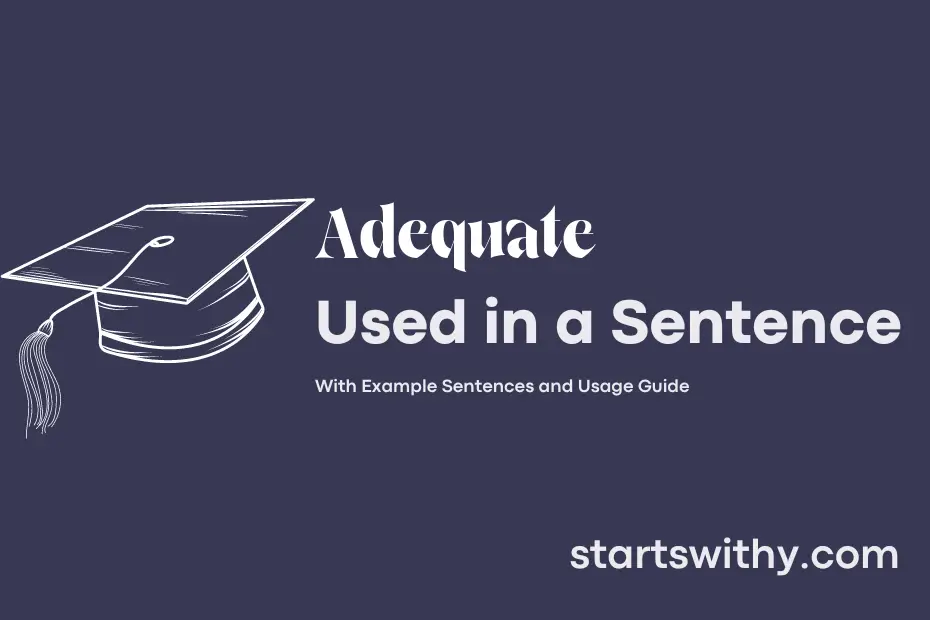Do you ever struggle with finding the right words to describe something? In writing, having an adequate vocabulary is essential for effectively conveying your thoughts and ideas. An adequate vocabulary refers to having a sufficient range of words at your disposal to accurately express yourself in various contexts.
Building an adequate vocabulary involves regularly learning and using new words to enhance your communication skills. By expanding your vocabulary, you can articulate your thoughts more precisely, leading to clearer and more impactful writing.
7 Examples Of Adequate Used In a Sentence For Kids
- Adequate food and water are important for staying healthy.
- Make sure you have adequate clothes on for the rainy season.
- It’s important to get adequate sleep at night to feel fresh in the morning.
- Don’t forget to pack an adequate amount of pencils for school.
- Your backpack should have adequate space for all your books.
- Please use an adequate amount of glue for your craft project.
- It’s always good to have adequate sunscreen on when playing outside.

14 Sentences with Adequate Examples
- Adequate preparation is essential for acing exams in college.
- Make sure you have adequate reference materials for your research paper.
- It’s important to have an adequate understanding of the subject before attempting the final exam.
- Budgeting is crucial to ensure you have adequate funds for the entire semester.
- Always carry an adequate supply of stationery to avoid last-minute rushes before exams.
- Prioritize getting adequate sleep to maintain focus and energy during lectures.
- Ensure you have an adequate amount of time allocated for each study session.
- Having adequate communication with professors can help clarify doubts and improve understanding.
- Use adequate online resources for supplemental learning alongside regular classes.
- A balanced diet with adequate nutrients is important for overall well-being and concentration.
- Seek adequate feedback from peers and professors to improve your academic performance.
- Make sure you have an adequate number of backup options for internships and placements.
- Focus on building adequate interpersonal skills to excel in group projects and presentations.
- Taking regular breaks during study sessions is essential to maintain adequate concentration levels.

How To Use Adequate in Sentences?
Adequate means enough or satisfactory for a specific purpose. To use it properly in a sentence, follow these steps:
- Identify the context: Determine the situation where you want to convey that something is enough or satisfactory.
- Choose the right place: Adequate is often used before a noun to describe the quantity or quality of something. For example, “He provided an adequate explanation for his absence.”
- Understand the meaning: Make sure you understand the meaning of adequate in the sentence. It implies that the explanation given was enough to satisfy the situation.
- Check the grammar: Ensure that the sentence is grammatically correct, with adequate placed in the right position for clarity.
- Practice: Try using adequate in different sentences to get a better grasp of how it works. For instance, “The team had adequate time to prepare for the competition.”
By following these steps, you can confidently incorporate adequate in your sentences to convey the idea of something being enough or satisfactory. Remember, practice makes perfect, so keep using the word in various contexts to improve your understanding and usage.

Conclusion
In written communication, constructing sentences with adequate clarity and coherence is crucial for effective understanding by readers. The examples provided demonstrate how precise and well-structured sentences can enhance the flow of information and help convey ideas accurately. By ensuring that each sentence is clear, concise, and logically connected to the preceding and following sentences, the overall readability and impact of the text can be significantly improved.
In summary, utilizing sentences with adequate structure and coherence is fundamental in effectively conveying information to readers. Striving for clarity and precision in sentence construction can greatly enhance the quality of written communication, making the intended message more accessible and comprehensible to the audience.



